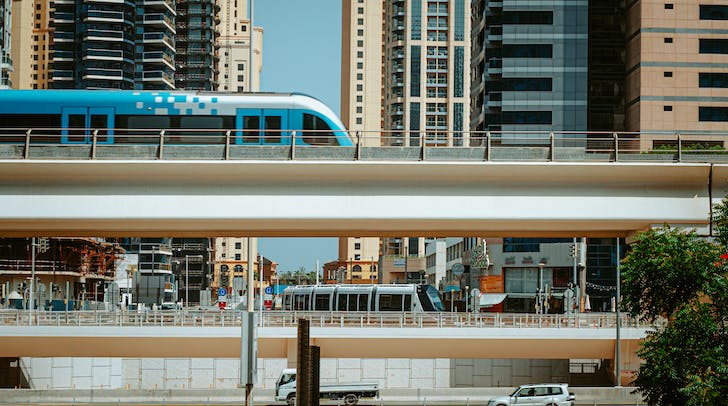COP28 hosted by the UAE at Expo City, Dubai, running until 12 December, is poised to prioritise discussions on reining in fossil fuels and curbing carbon emissions over the 13-day summit. COP28 is the summit where nations unite to devise solutions for the climate crisis, assisting vulnerable communities in coping with climate change impacts and striving to achieve net-zero emissions by 2050.
While world leaders connect in Dubai for COP28 to deliberate on environmental sustainability, UAE residents can also play their part in leading more eco-conscious lives and reducing their carbon footprints. As glaciers melt, temperatures rise, and incidents like forest fires, floods, and earthquakes escalate globally, the time to act and preserve the Earth is now. Here's how individuals can contribute to a sustainable lifestyle and make a positive impact in their daily routines.
Some Steps UAE Residents Can Take To Help Preserve The Environment
Say Yes To Public Transport
Transportation accounts for nearly a quarter of global carbon dioxide emissions. If you commute daily using a car, consider switching to public transport, as taking a train or bus for medium-length distances could reduce emissions by around 80%. Opting for trains and buses whenever possible can significantly lessen our carbon footprint.
For those still inclined towards cars, choosing an electric vehicle is a greener option. Driving an electric vehicle emits less carbon than a petrol or diesel car, even in regions with a relatively high-carbon electricity mix.

RTA DUBAI
In fact, Dubai's Road and Transport Authority (RTA) aims to achieve a fully electric and hydrogen-powered vehicle fleet for Dubai's public transport network by 2050.
Say 'No' to Plastic Bottles!
Choosing sustainable water practices, both for drinking and other uses, stands as a highly effective way to cut down on emissions. Globally, there's a widespread dependence on bottled water, with the average person in the UAE using up to 450 plastic bottles annually, and only a small portion get recycled. Making the switch to filtered water isn't just environmentally friendly but also cost-effective in the long run. Drinking filtered water is healthier, reducing exposure to toxins and micro-plastics, and it's environmentally responsible by minimising plastic waste.
Dubai Can Initiative
Dubai authorities launched 'Dubai Can' in February 2022, a citywide sustainability movement that has successfully cut down the use of over 7 million single-use plastic water bottles in its first year. The initiative has gained widespread acceptance in the city, involving homes, offices, hotels, schools, and the installation of 50 water fountains in various locations.
Strategically placed water fountains, thanks to Dubai Can, can be found in public parks, beaches, and tourist spots like Kite Beach, Dubai Marina, and Downtown Dubai. In collaboration with Talabat, a leading online food delivery service, the initiative has expanded its fountain locations and increased awareness.
Aligned with Dubai's commitment to the United Nations Sustainable Development Goals and hosting COP28 this year, Dubai Can, now almost two-years old, aligns with the city's sustainability strategy. This initiative complements the ban on single-use plastic bags since June 1, 2022, showcasing the UAE's dedication to environmental protection and waste reduction.
Try Reducing Meat Intake
If giving up meat entirely seems challenging, consider taking a step towards a more sustainable choice by reducing your intake. Making a conscious effort to cut down on heavy meat consumption can significantly contribute to lowering your carbon footprint. Meat production involves substantial amounts of water, land, and animal feed, with cows, in particular, leaving a considerable methane footprint.
In contrast, plant-based options like rice, potatoes, carrots, legumes, and apples have a carbon footprint less than half a pound per serving. Therefore, minimising meat consumption isn't just environmentally beneficial but also has positive impacts on your health. Taking this step can be a win-win for your well-being and the planet.
Use Less Energy And Save Electricity
Making small changes in your daily routines at home not only contributes positively to the environment but also helps reduce energy bills. Simple steps include turning off gadgets instead of leaving them on standby, air-drying clothes instead of using a tumble dryer, and being mindful of water usage. Processing and delivering water to homes require energy and resources, so consider turning off the tap while brushing your teeth, opting for short showers over baths, and boiling only the water you need.
Shop Less, Shop Only Essentials
The fashion industry undeniably has a significant negative impact on the environment, from biodiversity destruction during raw material extraction to the immense textile waste generated by overproduction. Despite these challenges, fashion remains a daily necessity. To contribute to environmental conservation, making mindful choices like buying only what you genuinely need can immediately reduce your carbon footprint. Opting for recycled or pre-owned items when possible is another eco-friendly choice. Alternatively, avoiding fast fashion, a type of affordable clothing that quickly follows trends, can make a positive impact. Fast fashion consumes more water and energy during manufacturing and shipping, and the products tend to have a shorter lifespan.

Opt For Organic And Local Seasonal Foods
Energy is consumed in planting, cultivating, and harvesting food, and even more is required for transporting it to processing, storage, and distribution centres before reaching markets. Opting for organic and fresh choices over high-end options can significantly reduce this energy consumption.
Regularly Service Your Car
A car that operates efficiently consumes less energy. Regular maintenance, including clean oil and well-adjusted belts and timing gears, ensures optimal fuel efficiency. Properly inflated tyres also play a crucial role, requiring less energy to achieve and maintain speed during driving. If tyre pressure is too low, the car becomes sluggish, leading to unnecessary gasoline consumption.
Sustainability Initiatives In The UAE
The UAE has implemented various national and local strategies with defined objectives to steer the country towards a more sustainable future. Key sustainability initiatives include the UAE Vision 2021, the UAE Centennial 2071, and the UAE Energy Strategy 2050, aiming for a 50% clean energy target. These initiatives have set clear sustainable development goals in the UAE and provide guiding principles for numerous upcoming projects.